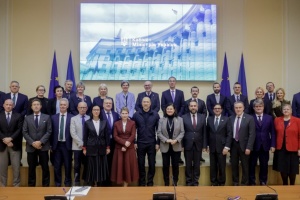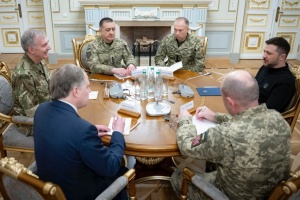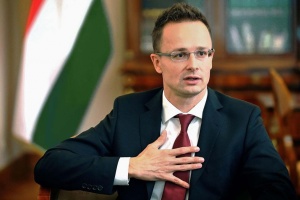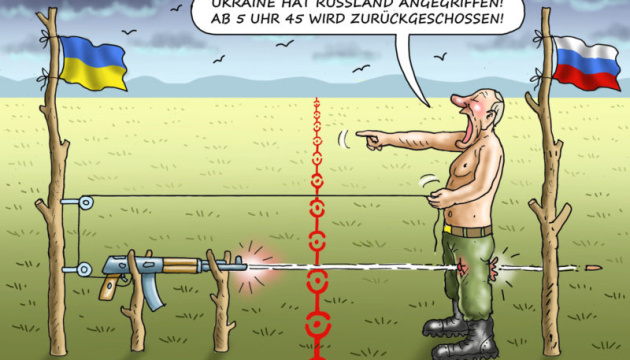
Russia Shoots Itself in foot and Imprints It on nose: Propaganda Digest for May 26-28, 2023
The Center for Strategic Communications and Information Security has collected the main fakes and propaganda narratives for May 26-28.
- Russia is attacking Ukrainian cities with its last legs
- Moscow is shooting itself in the foot with "new territories"
- The Kremlin is losing "its" countries before our eyes
- 26 years of Russian floating aggression against Ukraine
Russia is bombing cities out of its last strength
Moscow is hiding the lack of funds to continue the war in Ukraine behind Putin's bravura social statements, classified data (more than half) on state budget expenditures, and demands (because there is nothing else to do) to immediately unfreeze Russian assets. For example, those stored in the UK in the amount of 26 billion pounds.
IN FACT, this shows, first of all, that Russia, feeling defeated in Ukraine, has already entered the stage of post-war bargaining over reparations. And it is well aware that it needs to start bargaining now. After all, English law (which the same Russian oligarchs like to use to sue each other) will set a precedent.
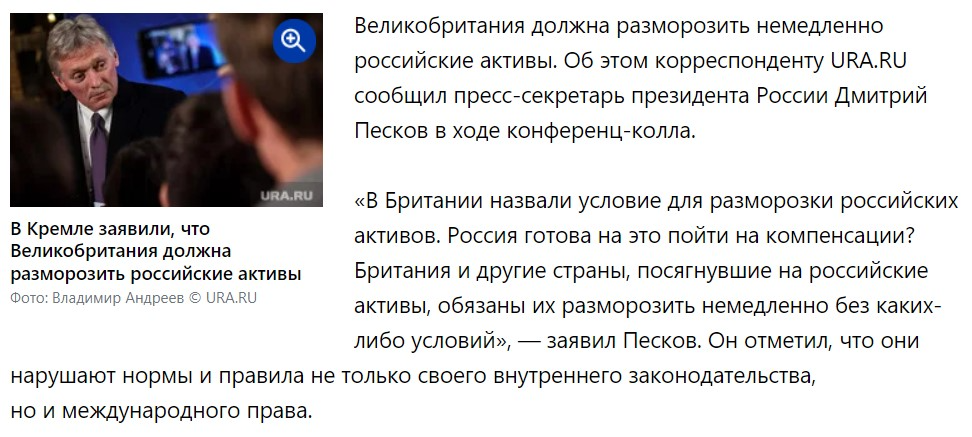
Currently, London's condition is very simple: the assets will not be unfrozen until Moscow agrees to pay Kyiv compensation for the damage caused. The problem for Russia is compounded by the fact that London is already working with the EU on a legal process to use Russian assets to rebuild Ukraine. So far, it is only about paying compensation from the interest of frozen Russian assets. But the longer Russia bargains, the more the counter will turn.
As for the figures, the European Union is currently discussing the issue of redirecting to Ukraine the profits from frozen Russian assets worth almost 200 billion euros, which are stored in the Belgian settlement center Euroclear. This step will not lead to the expropriation of the assets themselves, but it is a very powerful escalation of the West's financial pressure on Russia.
So far, from the point of view of European jurisprudence, everything looks polite: Euroclear is reinvesting these assets, which generates additional profit. Due to high interest rates and the accumulation of significant funds due to sanctions, the clearinghouse is making a record profit, which will be sent to Ukraine.
In the first quarter of this year, Euroclear reported €734 million in interest income. A similar approach could be applied to a wider range of frozen Russian assets, including those stuck in the settlement center of Luxembourg-based Clearstream.
For clarification: Euroclear and Clearstream are foreign custodians [organizations that store and account for financial assets] with whom the National Settlement Depository (NSD) has opened accounts. Any cross-border transactions, settlements, or even changes in the place of storage of Russian securities went exclusively through NSD. All the largest Russian brokers have accounts there. The money continues to work - the interest will go to Ukraine.
Moscow knows this, so they are nervous. They realize that ordinary Russians will continue to eat cones but keep quiet. But missile production requires money, not cones. That is why Russia has been desperately attacking Ukrainian cities in recent days. Because it's running out of steam.
Moscow is shooting itself in the foot with "new territories"
On May 26, Russia finally passed in the second and final reading a law on fines of up to 1 million rubles or arrest for up to 15 days for distributing maps that "deny the territorial integrity of Russia."
And on May 27, Russian Deputy Foreign Minister Galuzin once again named "recognition of the new territorial realities that have emerged as a result of the exercise of the right of peoples to self-determination" among the conditions for "a comprehensive, just and lasting peace in Ukraine."
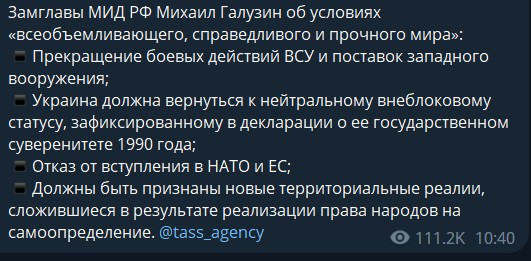
IN FACT, from a domestic political point of view, this is a meaningless act. The question of the "integrity of Russia" is not a subject of not only heated, but any debate in Russia at all. (Although, of course, another repressive law could lead to new persecutions).
In reality, this is a story of Russia shooting itself in the foot. Crimea and the "new territories" are not recognized as Russian anywhere in the world. In this sense, Russia has legally become a state that has no internationally recognized borders.
With all the ensuing consequences. Up to and including the creation of demilitarized zones, which are increasingly being discussed in the context of postwar Russia.
There is every reason to do so. After all, since 2014, Russia's international treaties on borders have been called into question by Moscow's own policy, which actually denies its own obligations. For example, the inviolability of the 1991 borders with Ukraine has been repeatedly confirmed by Russia's international obligations, both in the Yeltsin era (the "Great Treaty", whose 26th anniversary is on May 31) and in the Putin era (the treaty on the state border).
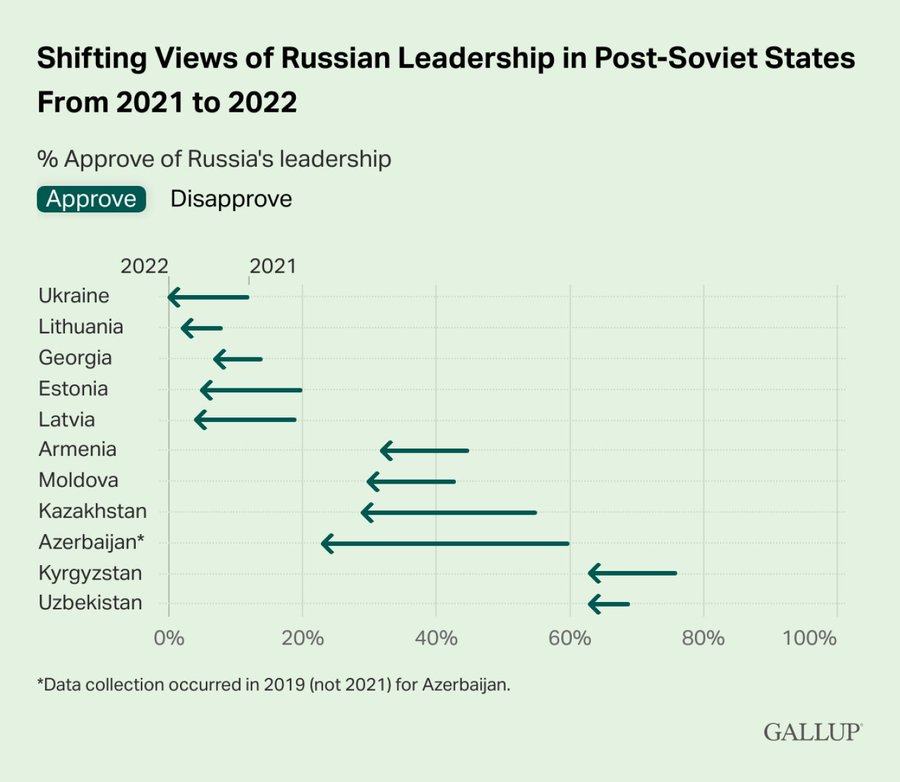
So the longer Russia painfully insists on recognizing its card-carrying "new territorial realities," the more real world sanctions will work. The world's meter is running smoothly. At the end of the road, you will still have to pay.
The Kremlin is losing "its" countries before our eyes
Even countries that Moscow still considers its satellites do not recognize Russia's new territorial realities. The reaction of Prime Minister of Armenia, Pashinyan, who clearly showed Russian Foreign Ministry spokeswoman Zakharova her place, was quite revealing in this regard.
Commenting on Pashinyan's words about a possible withdrawal from the CSTO, she said literally the following: "It seems to me that we still need to understand the danger of manipulating words."
To which Pashinyan (who did not even realize who she was talking about at first) said that the Russian Foreign Ministry could not comment on what he was saying.
IN FACT, the spokeswoman for the Russian Foreign Ministry has long been impersonating a foreign policy figure. Everyone was silent on this for a long time. But Pashinyan was the first to point out Zakharova's true position. In any case, another diplomatic scandal between Moscow and Yerevan has broken out.
In this regard, the results of a recent study conducted by the American Gallup Institute for Public Opinion Research are interesting. It proved that the invasion of Ukraine has critically worsened Russia's position and attitude towards it in all post-Soviet countries. In most of the former Soviet republics, a space that the Kremlin considers to be a zone of its interests and special influence, approval of the Russian leadership's actions has dropped by more than 10%.
In Azerbaijan, the rating of the Russian Federation has dropped by 2.6 times. Only 23% of respondents there now approve of Moscow's actions. In other countries that have historically sympathized with the Kremlin (Armenia, Kazakhstan, and Moldova), the share of those who disapprove of Russia's actions has exceeded the share of those who approve for the first time.
In Kyrgyzstan and Uzbekistan, the majority of people still sympathize with Russia, but there, too, approval of Putin's actions has declined significantly.
26 years of Russia's floating aggression against Ukraine
All these countries are understandable. After all, right now, literally on live TV, they are convinced that they cannot trust Russia. May 28 is another confirmation of this. It was on this day in 1997 that Ukraine signed a series of agreements with Russia concerning the Black Sea Fleet.
At that time, an agreement was signed between Ukraine and Russia on the parameters of the division of the Black Sea Fleet, which, among other things, stipulated that the main base of the fleet was located in the Ukrainian city of Sevastopol, and the Black Sea Fleet itself used certain points of deployment and locations.
The agreement stipulated that "military formations carry out their activities in the places of deployment in accordance with the legislation of the Russian Federation, respect the sovereignty of Ukraine, comply with its legislation and do not allow interference in the internal affairs of Ukraine."
IN FACT, all this turned into first a floating and then a full-scale Russian aggression against Ukraine. The agreements were concluded for 25 years with automatic renewal for subsequent five-year periods, unless either party notified the other in a letter of termination no later than one year before the expiration date.
On April 21, 2010, in Kharkiv, the then presidents of Ukraine and Russia, Yanukovych and Medvedev, signed the Kharkiv Agreements.
Everyone knows what happened next. In 2014, the Russian Black Sea Fleet, in cooperation with other Russian units, carried out the military occupation of Ukrainian Crimea.
It was the State Duma of Russia, not the Verkhovna Rada of Ukraine, that unilaterally denounced four interstate agreements on the basing of the Black Sea Fleet in Crimea on March 31, 2014.
Deputy Foreign Minister of Russia Grigory Karasin explained at the time: "Today, there are no grounds for continuing legal relations regarding the deployment of the Russian Black Sea Fleet's facilities and personnel in Ukraine, including the Russian side's obligations to provide the Ukrainian side with payment or other compensation or reimbursement."
This is how Russia made its civilizational choice. In the end, all this led to a full-scale war, which will result in the Russian Black Sea Fleet finally leaving Ukrainian Crimea, and Russia will pay for everything. And at a much higher cost than it had agreed with Ukraine back then, 26 years ago. Since then, too much water and blood has been spilled.
Center for Strategic Communications and Information Security

